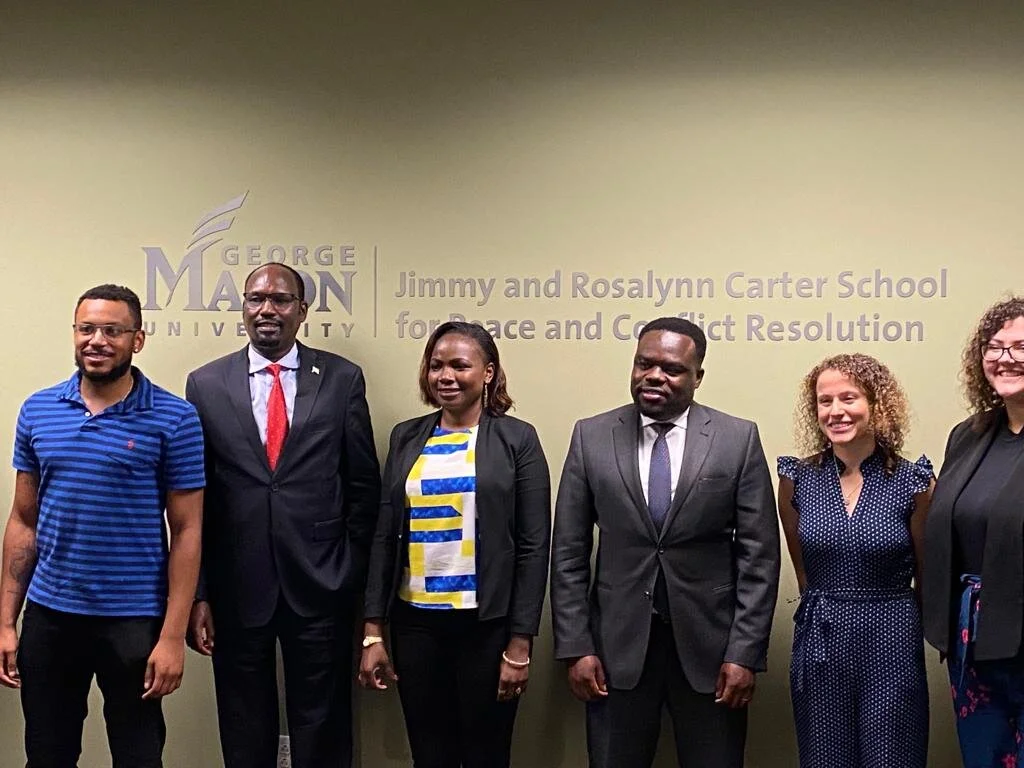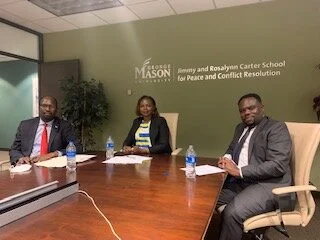The NCIC delegates in Founders’ Hall. From L to R: Commissioner Sam Kona, Vice-Chair Wambui Nyutu and Commissioner Dr. Danvas Makori
On Friday, September 3rd, MHCR held our first in-person event since 2019: “Healing Social Divides in Kenya”, hosted in Founder’s Hall at the Arlington Campus of George Mason University. MHCR invited three delegates from the National Cohesion & Integration Commission (NCIC) in Kenya: Vice-Chair Wambui Nyutu and Commissioners Sam Kona and Dr. Danvas Makori to participate in a panel, moderated by MHCR Communications Officer and Carter School graduate student, Cam Cassar.
The goal of this panel was to learn (1) how these Kenyan peacebuilders navigated a tumultuous period in history when their country became engulfed with widespread violence, (2) the methods and practices these Commissioners used to reduce and prevent similar conflicts from arising, and (3) how the US can adapt some of their techniques within the US context.
The NCIC was created in response to the post-election violence occurring after the 2007 re-election of President Mwai Kibaki. Some Kenyans believed electoral manipulation at the polls subverted the democratic process, and this led to ethnic violence breaking out in Kenya, home to over 40 different ethnic groups. However, much of the violence was directed towards the Kikuyu tribe, the tribe Kenyan President Kibaki belongs to. The goal of the NCIC is to address and reduce inter-ethnic conflicts within Kenya and ensure the violence ensuing after the 2007 election never happens in the country again.
Cam asked pointed questions centering on each delegates' experiences and expertise. Commission Chair Wambui Nyutu’s professional background focuses on law, where she served as a mediator and founder of the youth-led Tuinuke Initiative: concerned with economic, political, and social issues affecting Kenya’s youth. Kenya has an extremely large youth population and Nyutu is adamant in her belief that if the Kenyan youth unite under a common goal, then “you can unite the country.“ Nyutu contends Kenyan youth are the future and “if we can provide them with the proper tools, we can take the necessary and proper steps towards a united Kenya.”
Commissioner Sam Kona is a conflict resolution, governance, and stability expert with over 25 years’ experience in public, private, and civil society sectors. Kona has worked with many international organizations, including USAID, and has played a huge role in developing early conflict warning systems in Africa. Cam asked Kona about his role within these systems and to elaborate on what goes into crafting these systems. Mr. Kona explained these systems look at the historical context of specific regions, the state of governments in these regions, and any signs of ethnic strife. Kona also described how peacebuilders can do everything in their power to detect the early signs of the conflict and warn officials - but at the end of the day, those in power must respond fully to quell these conflicts before they reach a point of ‘no return’. Kona noted numerous cases where conflicts may have been avoided if a proper preventative response was in place.
Commissioner Dr. Danvas Makori comes from a theology background and is an advocate of the primacy of spirituality in navigating post-conflict zones. Cam asked Dr. Makori to give examples of apology, repentance, and forgiveness practices being used in Kenya. Dr. Makori explained the NCIC led workshops to bring together members of the different Kenyan ethnic groups, in what was essentially a truth commission and allowed everyone to speak about their role in the 2007-2008 post-election violence. Some Kenyans were perpetrators, some were victims, and some were bystanders during this time. He explained how everyone was able to tell their side of the conflict and by the end of the exercise, people were overwhelmed with a mix of different emotions. Dr. Makori attested, “Some felt remorseful, some felt a weight off their shoulders, some people felt no change at all but at the end of the day, it was a step in the right direction for the people of Kenya and our future.”
All three panelists shared powerful anecdotes from their experiences facilitating reconciliation in Kenya. Each hail from different backgrounds, yet all converged under the common NCIC goal of “One People, One Nation, One Destiny.” Exchanges such as these are crucial for post-conflict reconciliation, rebuilding, and rebirth. Although context and cultures may differ across contexts, these Commissioners highlighted many common themes and practices that can unite reconciliation efforts: from Kenya, to the US, and beyond.
The MHCR team members alongside the NCIC delegates. From L to R: Cameron Cassar, Sam Kona, Wambui Nyutu, Dr. Danvas Makori, Hannah Adamson, and Merisa Mattix


